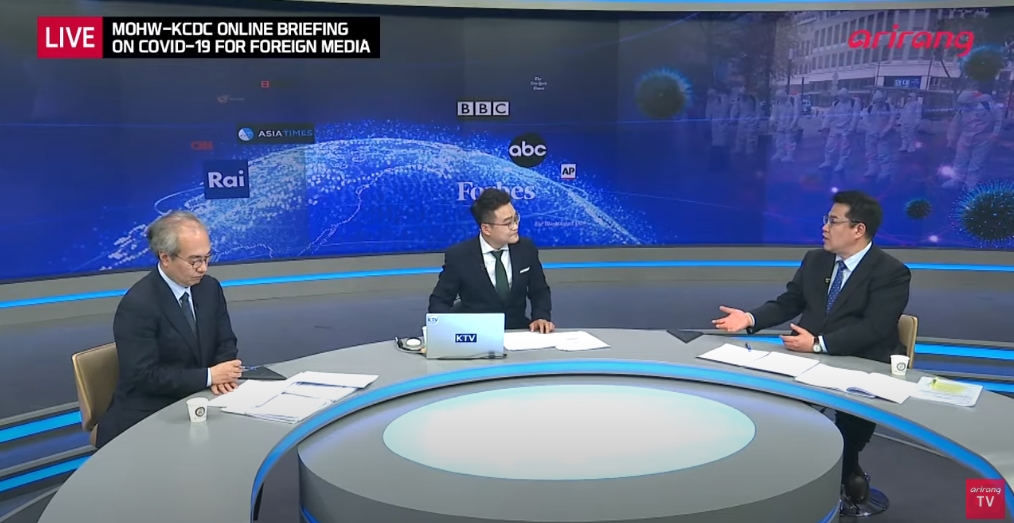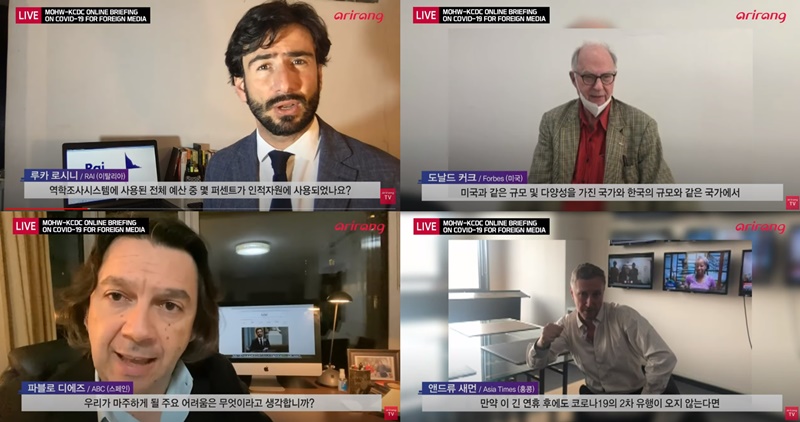
An online briefing for foreign media is held on May 7 on responses to the novel coronavirus disease (COVID-19) and plans thereafter at a KTV studio in Sejong Special Self-Governing City. Briefing panelists Kwon Jun-wook (left), deputy director of the Central Disease Control Headquarters, and Son Young-rae (right), spokesperson for the Ministry of Health and Welfare, answered questions from international journalists.
By Lee Kyoung Mi and Yoon Sojung
Photos from Arirang TV
"I wonder on what basis Korea was able to ease social distancing amid the outbreak of the novel coronavirus disease (COVID-19)." (Morten Soendergaard Larsen of the Jyllands-Posten from Denmark)
"I would like advice from the Korean government on how a country can open a closed border because of COVID-19." (Manish Shukla of the Zee News from India)
"I would like to know about the clinical research system of Korea." (Luca Rosini of RAI from Italy)
These were among the questions asked in an online briefing for international media on May 7 at a KTV studio in Sejong Special Self-Governing City. The briefing was jointly organized by the Ministry of Culture, Sports and Tourism, the Ministry of Health and Welfare, the Korea Centers for Disease Control and Prevention (KCDC) and the Korean Culture and Information Service.
Amid the global COVID-19 pandemic, foreign media have kept asking questions on Korea's quarantine system. As such, the government prepared the briefing specifically for such media.
The latest online briefing was held live and attended by approximately 40 journalists from 15 countries, and included news outlets like the U.S. business magazine Forbes, EFE of Spain and NHK of Japan.
The expert panel comprised Deputy Director of the Central Disease Control Headquarters Kwon Jun-wook and Son Young-rae, spokesperson for the Ministry of Health and Welfare. They answered questions sent in advance by journalists abroad, as well as those received in the live open chat room in real time.

Journalists from 15 countries on May 7 ask questions in an online briefing for overseas media jointly organized by the Ministry of Culture, Sports and Tourism, the Ministry of Health and Welfare, the Korea Centers for Disease Control and Prevention and the Korean Culture and Information Service.
When asked what the U.S. can learn from Korea's COVID-19 response by Forbes reporter Donald Kirk, the deputy director gave as his answer the national health insurance system.
"Thanks to a system free from financial and physical barriers, people can go to either a small clinic or a general hospital depending on their symptoms," he said, adding, "The rapid supply of diagnostic kits was a major role played by guaranteed health insurance."
Patrick Welter of the German daily Frankfurter Allgemeine Zeitung asked how Korea sees the post-COVID-19 era.
Spokesperson Son responded by mentioning a tolerable level of control within society, and stressed international cooperation by saying, "Korea will share its experience with other countries."
Mehmet Sah from Turkey's Anatolia News Agency asked what advice Korea would give to the international community. The KCDC executive responded by saying that if the world maintains efforts to trace all confirmed cases and inform on all developments swiftly through a daily briefing, it should adequately overcome the disease backed by scientific basis and civic participation.
The briefing panelists also answered questions about Korea's overall experience in COVID-19 disinfection. The answers included explanations on the country's persistent epidemiological surveys, detailed guidelines on "distancing within daily life" and how Korea managed the situation in a stable manner without closing borders.
The spokesperson said, "The Korean government has carefully dealt with an unprecedented situation of adapting (lifestyle quarantine) to society in the long run."
"This can be successful only if combined with the people's creative efforts. If every country can share such efforts, it will be an opportunity to hasten the end of COVID-19."
With simultaneous interpretation in English, this 90-minute briefing was aired live on KTV, Arirang TV and the YouTube channel of Korea.net. Other questions not covered in the briefing will be answered later in written form.
km137426@korea.kr